
Turning Back The Pages: Mohammed Azharuddin

Mohammad Azharuddin- a name that is too familiar to forget. The hero of a past generation, the villain of the generation that followed. And today, a name inscribed in a corner in the history of Indian sports. Azhar is a player whom most cricket fanatics would still remember. But for the new generation, the chances are that at least a few would be unaware of the man called Azharuddin and who he really was. So a recap would help.
Azharuddin was a batsman who made his test debut for India in as early as 1984 and his ODI debut a year later. Before late, he had become an integral part of the Indian middle order, and by 1991, he reached the peak of his career bagging the Wisden Cricketer of the Year award. And when he took over the leadership of the team when Kris Srikkanth stepped down in 1989, it was the beginning of a new era of Indian cricket; he successfully lead India to 14 test wins and 89 ODI wins out of the 47 tests and 143 ODIs the team played under his captaincy.
After almost a decade of inspired captaincy, he left the whole nation in shock when he admitted to have fixed matches during the 1999 home series against South Africa. That was followed by a lifetime ban and dismally ended an illustrious career that spanned 15 years.
Mohammad Azharuddin is rightly marked in cricketing history in dark colors, since the stain of his unethical act exists even today. Evil must be punished and yes, Azhar’s deed was punished. Nothing and nobody can justify the wrong he did.
But in the midst of that one wrong deed and its consequences, what went unnoticed were the contributions of a phenomenal cricketer. In the 90’s, as a young kid who loved watching the Indian team play, I loved Sachin’s smile and accent during his Man of the Match talks, I loved Sourav’s funny mustache, I imitated Srinath and Kumble’s run ups and actions. However, the one who actually inspired me and who I wished to be was Azhar.
One of the matches I still remember watching is the first match of the Sharjah Cup in 1998-99 against Sri Lanka; even when Agarkar’s heroics saved the match for India, I saw everyone around me feeling sorry for Azhar, as he was bowled when he unselfishly tried to get India across the finish line whilst only six runs away from a century. Ever since, Azhar became my favourite. But before I could relish his game, he was gone, and I was left searching my uncle’s VCR collections to know how he played. And to my happiness, my uncle handed me a couple of dozen VCRs, on which I feasted every single day, for many months that came.

Today, as I debated with a friend over the credits that this man deserved, I wished everyone who thinks he’s just a match-fixer had watched him play at least once.
For all those who forgot or do not bother to remember, Azhar was a batsman of class. The drives he played were a pleasure to watch. The wristy flicks he played were a synonym of elegance. One of the best players of spin during his time, Azhar received praises from his contemporaries and cricket gurus alike. Former Indian captain, Venkataraghavan once remarked: “Azharuddin has the best wrists in the game, but Sachin isn’t far behind.”
A player to whom even Sachin came second- that was Mohammad Azharuddin!
If not for the scandal, he would have definitely featured as one of India’s most loved cricketers. He is scored with almost 15,000 runs in International cricket, at averages of 45 in tests and 37 in ODIs; stats that many tend to pretend unseen.
He is one of India’s best captains ever, an achievement that has been forgotten with time. He features on many a ‘top five’ lists- the maximum number of catches (105 in tests and 156 in ODIs), the fastest centuries (in 62 balls in ODI and in 74 balls in test), the highest scores in an ODI innings (153*) and is also the only cricketer to score a century in each of the first three test matches that he played. Surely, a cricketer of such talent deserve better than he actually received.
Cricket is a religion in India and cricketers are considered Gods. India is a nation which has a culture that has always promoted patience and forgiveness. Putting these contexts together, the time is nigh that we forgive this extraordinary cricketer for his mistake and place him back with the other deities. After all, as my father says-
“Justice was delivered to Azhar The Match-Fixer,
But Justice was never delivered to Azhar, The Cricketer.”